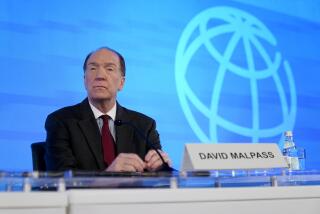World Bank Calls Third World Debt Plan Inadequate
- Share via
WASHINGTON — The World Bank declared Sunday that the strategy that the United States and other industrial nations have been pursuing to deal with the Third World debt problem is not working well enough, and it called for stepped-up efforts to spur more growth in debtor countries.
In its annual report on the world debt situation, the 151-country organization, whose mission is to help developing countries, said that although debtor nations have made some progress since the problem intensified in 1982, “an end to the debt crisis remains elusive.”
The report blamed the fact that new lending by commercial banks has dried up during the past three years, which it said has stifled investment in developing countries, locking debtors into a vicious circle that prevents them from stimulating enough economic growth to attract new financing.
While stopping well short of advocating any new massive debt-relief schemes, the document recommended shoring up the current debt strategy by relaxing government regulations and tax laws to enable commercial banks to write off more of their questionable loans.
It also called on commercial banks to pass along to debtor countries more of the saving they enjoy when they discount or write off these loans. And it urged debtor countries to intensify their efforts to restructure their own economies to make them more efficient.
The report, which constituted the bank’s strongest pronouncement on the debt situation so far, appeared to be part of a major new effort by the Washington-based institution to lend its own voice to the growing number calling for a change in global debt strategy.
It marked the first time that an international institution with the bank’s stature has said flatly that the current strategy is inadequate. Most other governments and international lending agencies have been more muted in their criticisms.
The current debt strategy, outlined in 1985 by James A. Baker III, then Treasury secretary, calls for commercial banks to step up their lending to help debtor countries finance new growth. In return, the debtors were to put their own economic houses in order.
The plan was initially hailed as a political breakthrough, and it succeeded for more than two years in warding off unrest among debtors. But commercial banks, wary of increasing their exposure, essentially stopped further new lending, and the process began to bog down.
Over the past few months, France and Japan have called for major changes in the global debt strategy, and even the Soviet Union has chimed in with a proposal for extending or writing off some of the loans.
Meanwhile, debtor countries themselves have raised warnings about potential unrest unless some new relief is extended. The new presidents of Mexico and Venezuela have called for renegotiation of their outstanding debt. Brazil and Argentina already are in turmoil.
Current U.S. Treasury Secretary Nicholas F. Brady, who will continue in that post during the Bush Administration, has expressed interest in “updating” the debt strategy, but aides say he still is exploring the issue generally and has not drafted any proposals.
Earlier this month, Moeen Qureshi, the World Bank’s top lending officer, outlined his own “debt workout strategy” that included stepped-up lending and investments by commercial banks and increased lending by governments and international organizations.
In part because of the pullback by commercial banks, the World Bank has been taking on a growing proportion of total lending to Third World debtors. Meanwhile, narrower-focus schemes for reducing outstanding debts by converting them to equity have had only a modest impact.
Opposed Larger Role
As a result, the debt balance has shifted to the point where developing countries as a group are repaying about $43 billion more a year to creditors than they are receiving in new loans--a burden that experts say is sapping their ability to grow.
It is still not clear how the debt issue will be resolved. The Reagan Administration has opposed any larger role for governments and international agencies, contending that banks, not taxpayers, ought to finance any losses stemming from defaults by Third World countries.
Sunday’s report estimated the total debt owed by Third World countries will swell to $1.3 trillion next year, up 3% from current levels. By contrast, when the debt “crisis” erupted in 1982, the figure was $831 billion.
The report said that despite some progress since the debt problem began, Third World countries “are still no better off than in 1982. . . . Growth on a per-capita basis has not resumed.” And the debtors’ efforts to restructure their own economies have been “uneven and often intermittent.”
More to Read
Inside the business of entertainment
The Wide Shot brings you news, analysis and insights on everything from streaming wars to production — and what it all means for the future.
You may occasionally receive promotional content from the Los Angeles Times.










